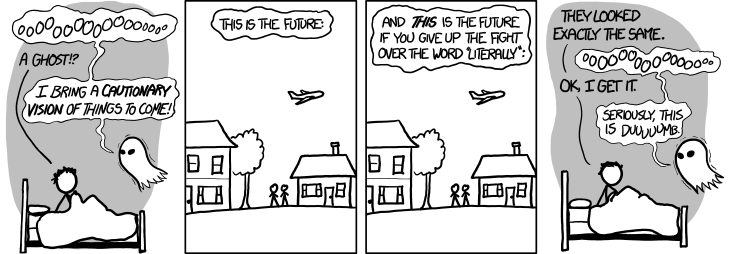 |
| Image description: A red O I set the size of this pic to "medium." Because this post is not about the big O. |
Then a kid came along and distracted me from pretty much everything. Then cancer. Then other stuff. Some of those articles took a lot longer to prep and write than others and they fell by the wayside a bit. Suffice to say that I soon had my own following wearing glasses and tartan plaid and telling all my new fans that my older stuff from before I sold out was way better.
Well, I never forgot all those threads left incomplete. And just like Leela Bruce is firing up a new fighting article about dialogue attribution tags, and I'm spending some time restarting a new Skyrim game, the glossary will continue forth....right where we left off.
Creative Writing Terms beginning with the letter N.
Ode- a poem written in the form of an address to a particular subject, often lyrical and elevated in style–which is another way of saying it's hella pretentious to do an ode about a person unless you really know what you're doing. So if you use an ode to get laid, first of all go you, but more importantly keep that shit on the downlow like your pet names and baby talk. Ironically, the less you care about something or the less of a person it is, the more socially acceptable an ode is. Odes to wind, seasons and urns are fantastically famous. Odes to cheeseburgers are awesome, and need to be famous.
Of course if you DO really know what you're doing, well....then all bets are off, you magnificent poetic heartripper.
Technically your classic Greek odes had three parts (strophe, antistrophe, epode) but it's SUPER nerdy to understand it, so the quick and dirty version is that Greeks had kind of funny names for iambic and trochaic. (This won't be on the quiz.) If "iambic" and "trochaic" are even too nerdy for you, just know that it has to do with stressed syllables, go enjoy your robust social life, and leave us nerds to our nerdry.
Onomatopoeia- a word that is formed using the sound of the idea it represents. It's a difficult concept to explain, but entirely too much fun to come up with examples of, so here we go:
Whisper- See how the sound of the word sounds like a whisper.
Splash- Sounds like something hitting the water
Click, Clink, Thud, Thump, Sizzle, Pop, Plop, Murmur
 |
| Image Description Pam from Archer looking majestic AF and riding a dolphin while holding a beer and a sandwich. The word "Sploosh" is on a banner. |
Organization- A word I added to this list because seriously, have you seen how few literary and creative writing terms start with O? It's ridiculous. There's like...three. How am I supposed to work like this? I thought you people were creative! Come up with some O words already!
Anyway your stories need some kind of organization, and while fiction is often chronological, much of it is not. The only real rule for fiction is that anything that isn't more of a vignette should follow a pattern of rising action, climax, and denouement. Some fiction is spatial, describing a place and using the rising tension to reflect an increase in the intensity of the conflict within successive spaces. Some fiction bounces around in time to literally categorize every interaction in a continuum of least to most in rising action. (Consider how Pulp Fiction moved all around in time, but each successive story moved further from nihilism to personal redemption.)
Overview- Mostly a nonfiction publishing term (as fiction usually requires books to be completed before payments and contracts or "advances" to veteran authors). However, just as some non-fiction publishers will read completed manuscripts without proposals, some fiction publishers and/or agents will require proposals.
An overview refers to the first (and most important part) of your book proposal. It may well be the most important piece of writing you ever do....including your make-or-break final essay on the transition of romantic literature through gothic and to the modern detective novel and how the knight errant and the modern detective are the same literary archetype.
Other parts of a proposal include sample chapters and sick bribes.
Oxymoron- a figure of speech (often an idiom) combining two terms of apparent contradiction. We often study the poetic, Shakespearian ones like "sweet sorrow" or "bittersweet," but the best jokes can come from pointing and giggling at those that have become idiomatic in our culture or are part of commercial branding. Note: oxymorons aren't necessarily grammatical errors. Many simply illustrate the paradox and plasticity of English.
- Act naturally.
- Virtual reality.
- Genuine veneer.
- Mandatory option.
- Sports sedan.
- Full time daycare.
- Wireless cable.
- Minor crisis.
- Definite maybe.
- Only choice.
And my personal favorite:
- Almost exactly.
Letter P coming soon. (Like way sooner than the length of time between N and today.)
Have you enjoyed this post and want to see more like it? Do you like Writing About Writing and want to see it thrive? Do you want to grudge follow me and be there to laugh when I open up to my "inner circle" about my pain and angst? Support my Patreon, and for as little as a dollar a month (that's less than the cost of a movie every YEAR) you can take place in patron-only polls, "VIP room" discussions about future writing projects, support the writing that entertains you, and help me pay some bills so I don't need five day jobs. Plus more benefits for bigger donors.

























